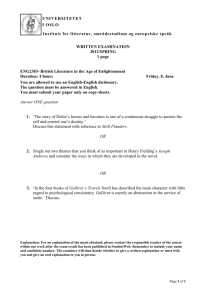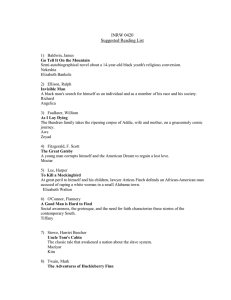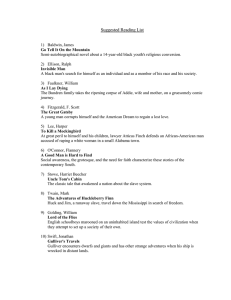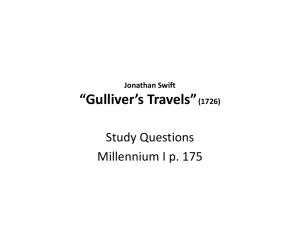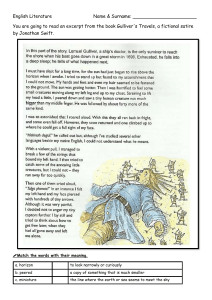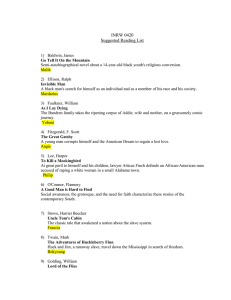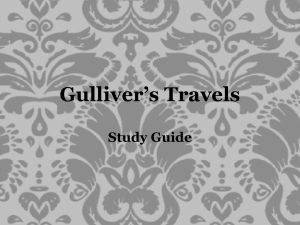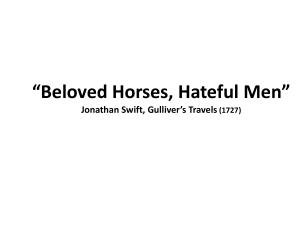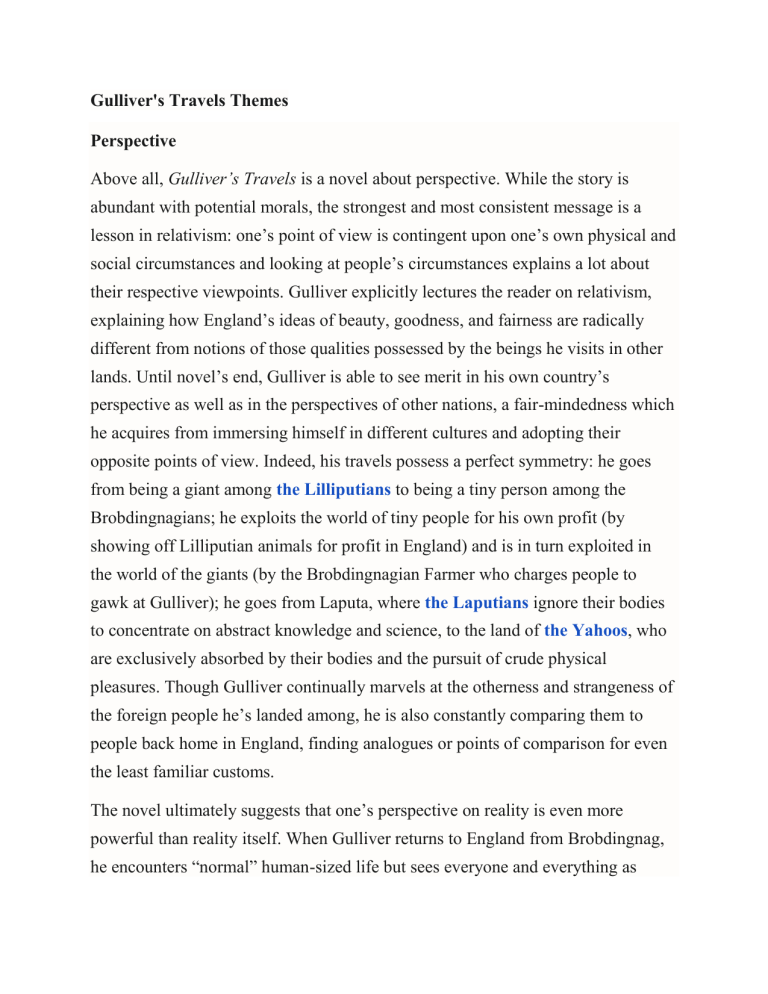
Gulliver's Travels Themes Perspective Above all, Gulliver’s Travels is a novel about perspective. While the story is abundant with potential morals, the strongest and most consistent message is a lesson in relativism: one’s point of view is contingent upon one’s own physical and social circumstances and looking at people’s circumstances explains a lot about their respective viewpoints. Gulliver explicitly lectures the reader on relativism, explaining how England’s ideas of beauty, goodness, and fairness are radically different from notions of those qualities possessed by the beings he visits in other lands. Until novel’s end, Gulliver is able to see merit in his own country’s perspective as well as in the perspectives of other nations, a fair-mindedness which he acquires from immersing himself in different cultures and adopting their opposite points of view. Indeed, his travels possess a perfect symmetry: he goes from being a giant among the Lilliputians to being a tiny person among the Brobdingnagians; he exploits the world of tiny people for his own profit (by showing off Lilliputian animals for profit in England) and is in turn exploited in the world of the giants (by the Brobdingnagian Farmer who charges people to gawk at Gulliver); he goes from Laputa, where the Laputians ignore their bodies to concentrate on abstract knowledge and science, to the land of the Yahoos, who are exclusively absorbed by their bodies and the pursuit of crude physical pleasures. Though Gulliver continually marvels at the otherness and strangeness of the foreign people he’s landed among, he is also constantly comparing them to people back home in England, finding analogues or points of comparison for even the least familiar customs. The novel ultimately suggests that one’s perspective on reality is even more powerful than reality itself. When Gulliver returns to England from Brobdingnag, he encounters “normal” human-sized life but sees everyone and everything as miniature. He thus misgauges size, misjudges people’s health, and generally misunderstands his situation until enough time passes for his perspective to adjust. Likewise, Gulliver’s time spent among the Houyhnhmns enables him to see his own society in a new way. Though he has been eager to go home after all his prior adventures, he no longer wants to return to England after living amongst the Houyhnhmns, for he has so internalized their perspective that he sees all human beings as Yahoos. He is disgusted even by his own reflection and starts affecting the manner of a horse. Though he is, from a biological standpoint, still fully human, his new perspective has transformed him into a Houyhnhmn and he can no longer function in human society. Moral vs. Physical Power By placing Gulliver amongst people of extremely different physical circumstances than his own, Gulliver’s adventures dramatize the distinction between moral and physical power. In Lilliput, Gulliver’s huge size advantage over the Lilliputians would make it easy for him to treat them like inhuman vermin and to assert himself against them by physical force (he even imagines squashing them by the handfuls during their initial encounter on the beach). But Gulliver’s willingness to empathize, reason with, and respect the Lilliputians despite their diminutive size yields a much more meaningful, rewarding experience (at least until the prince turns against him). Conversely, in Brobdingnag, the Brobdingnagians could easily dehumanize and squash Gulliver, but Gulliver is impressed by their kindness and willingness to listen and empathize with him (though they do treat Gulliver a little more like a cute clown than he would like). Through the example of the Lilliputians’ ridiculous, futile battles over how best to crack an egg, the novel suggests the absurdity of all warfare as a means to settle matters of the mind and faith. Through the example of the Laputian king and the Luggnaggian king, the novel presents a parody of tyrannical excess and shows the dangers of rulers who assert themselves through physical power. In Laputa, the king is totally out of touch with his people and maintains his hold over the people simply by making himself “taller” than they are by floating above them on his island. In Luggnagg, the king demands grotesque demonstrations of physical supplication, making subjects crawl on their stomachs licking the dirty floor before him. As the novel considers the dangers of physical power in society, it also considers the physical character of the individual and reflects on how best to handle one’s body. The Laputians’ and Lagadans’ obsession with reason and knowledge has rendered them utterly out of touch with their bodies. Their inability to function in the practical, physical world has in turn destroyed their society, and their example indicates that ignoring physical reality inevitably leads to suffering. Among the Yahoos and the Houyhnhnms, Gulliver learns that the possession of a human body does not automatically elevate a person over the animals. The Yahoos, it turns out, are much more bestial than the animal Houyhnhnms. This directly contradicts the common European assertion of the time that human bodies were automatically superior to animal bodies because the human form necessarily contained moral and rational power. Indeed, the Houyhnhnms possess a stronger moral compass and sense of reason than the Yahoos and the Europeans alike. At each instance, the novel thus shows that true superiority and worthy power come from a moral, rational mind in harmony with the body it inhabits. Society and the State As Gulliver travels from society to society, he observes each one’s organization in detail and compares and contrasts it with the English state. Though all of the societies visited are flawed, several possess some admirable qualities and almost all of them play out the consequences of a particular utopian ideal. Their admirable qualities include the peaceful Brobdingnagian king’s disgust at the thought of gunpowder and rule by violent force; the Lilliputian king’s initial generosity and warmth towards the foreign Gulliver; the Houyhnhnms’ reason-driven peace and order. But the societies also demonstrate the unfortunate outcome of certain utopian ideals. Lilliput separates its children from their birth parents (as Plato himself advised in), but the practice does not end up yielding very mature or reasonable adults. The Lilliputian king and his court are petty grudge-holders, no better than the monarchs of Europe. Laputa dedicates itself to reason and scientific progress but its devotion produces only trivialities and useless inventions, leaving the useful parts of society to decay. The Houyhnhnms practice strict family planning, but the plans leave no room for the passionate and beautiful parts of love and marriage. The Houyhnhnms’ also transcend humanity’s ills and evils, but this, too, ends up stripping them of personal identity so that their society lacks humanity’s rich vividness and seems to the reader a bit too robotic, even as Gulliver professes to love it. Gulliver himself attempts to live the ideal of uniting with nature by living among the Houyhnhnms, but this commitment only dooms him to dissatisfaction and insanity in the human life he must inevitably return to. Swift never draws up a formula for an ideal state and society because he does not believe that one exists. However, by showing the goods and ills of the vastly different societies Gulliver visits, Swift implicitly points out the errors of human society while also cautioning against the embrace of certain “utopian” solutions. Knowledge Gulliver’s Travels also considers the value of knowledge and its best applications in life. The novel surveys many different kinds of knowledge and examines the effect they have on the people possessing them. Gulliver’s worldly knowledge about other societies and lifestyles makes him tolerant and open-minded person, able to see both sides of most stories while many of the minds around him are more rigid. Still, it’s unclear if this knowledge actually serves Gulliver well—it ends up, after all, leaving him dissatisfied and lonely, estranged from his family and his society and wishing futilely that he was one of the Houyhnhmms. In Brobdingnag and the land of the Houyhnhnms, the novel considers the kind of political knowledge that both the Brobdingnagian king and the Houyhnhnms lack. Yet, while both are ignorant of gunpowder, Machiavellian strategies, and the use of fear and violence to keep people in line, both organize successful, happy societies that seem much more functional than those governed by the more “sophisticated” political knowledge of Europe. The novel also compares practical scientific knowledge, as practiced to valuable effect by the Lilliputians and the Houyhnhnms, to abstract scientific knowledge, as practiced to useless effect by the the Laputians. The Laputians’ knowledge, Swift shows, may as well be ignorance, for they don’t put their theories to any useful purpose and only waste their lives on fruitless experimentation. Finally, the novel considers self-knowledge as it is gradually acquired by Gulliver over the course of the novel, most so in Book 4. One could see Gulliver’s end as an awakening to his true self (and the true self of all human beings), which leaves him disgusted with human nature. However, one could also see Gulliver’s end as a tragic exaggeration of self knowledge such that he amplifies human evil beyond its actual proportions and thereby bars himself from integrating productively into the human society he should be a part of. In most of these instances, knowledge becomes harmful when it approaches an extreme: problems arise if one only understands scientific and mathematic abstraction, as the Laputians do, or if one only pursues knowledge of foreign lands without spending time at home among one’s own people, as in the case of Gulliver himself. Thus, the novel seems implicitly to advocate a moderate balance between practical and abstract knowledge, between knowledge of the outside world and knowledge of one’s own position in it Truth and Deception Much of the novel’s plot action is driven by deceptions, and Gulliver takes note of the inhabitants’ feelings about truth and lying in every country he visits. Deceptions that drive plot action include the Lilliputians’ secret plot to starve Gulliver to death and Gulliver’s subsequent deceits to escape Lilliput. Then, in Brobdingnag, Gulliver deliberately conceals as many of his mishaps he can from Glumdalclitch in order to try to maintain his dignity and freedom. Later, Gulliver lies to the Japanese emperor about being Dutch in order to be granted passage to England. Finally, in the land of the Houyhnhnms, Gulliver deliberately avoids correcting the Houyhnhnms misimpression that his clothes are a part of his body, which helps distinguish him enough from the Yahoos to convince the Houyhnhnms he isn’t really one of them. From society to society, Gulliver also tracks the inhabitants’ different attitudes towards truth and falsehood. The Lilliputians’ treat fraud as the highest crime and profess a rigorous devotion to honesty (which is, of course, somewhat undercut by the court’s deceptive plot against Gulliver). In Glubbdubdrib, Gulliver explores his own culture’s attitude towards truth by summoning ghosts of the past and having later thinkers show ancient thinkers like Aristotle the falsehood in their theories while also exposing rampant deception among the English royalty. In the land of the Houyhnhnms, Gulliver encounters a purely honest society, so committed to truth that its members don’t even have a word for ‘lying’ and only refer to a falsehood as “the thing which is not.” Yet even as the novel raises earnest questions about the value of honesty, it also toys with the reader, suggesting that truth may be more subjective than absolute. As certain as the novel’s human readers are that the societies described are pure fantasy, so too do the characters that inhabit those societies refuse to believe Gulliver’s descriptions of human society and insist that Europe is make-believe. Further, Swift makes a concerted effort at verisimilitude by including the preface from Richard Sympson, which repeatedly alludes to geographical facts omitted, supposedly to prevent boredom. (Earlier editions of the novel took this verisimilitude even further by keeping Swift’s name off the book and publishing it under the pseudonym Lemuel Gulliver.) Swift also has Gulliver attest again and again to his own honesty and to the true nature of his account. Beyond insisting that it is the factual count it emphatically isn’t, Gulliver’s Travels also criticizes the novelistic form it is when Gulliver encounters the erosive influence of novels on readers’ brains. As with knowledge, then, Swift presents a mixed message on truth: while his work advocates for honesty among individuals and human governments, it also suggests that life will always contain some degree of unknowability and confusion.
